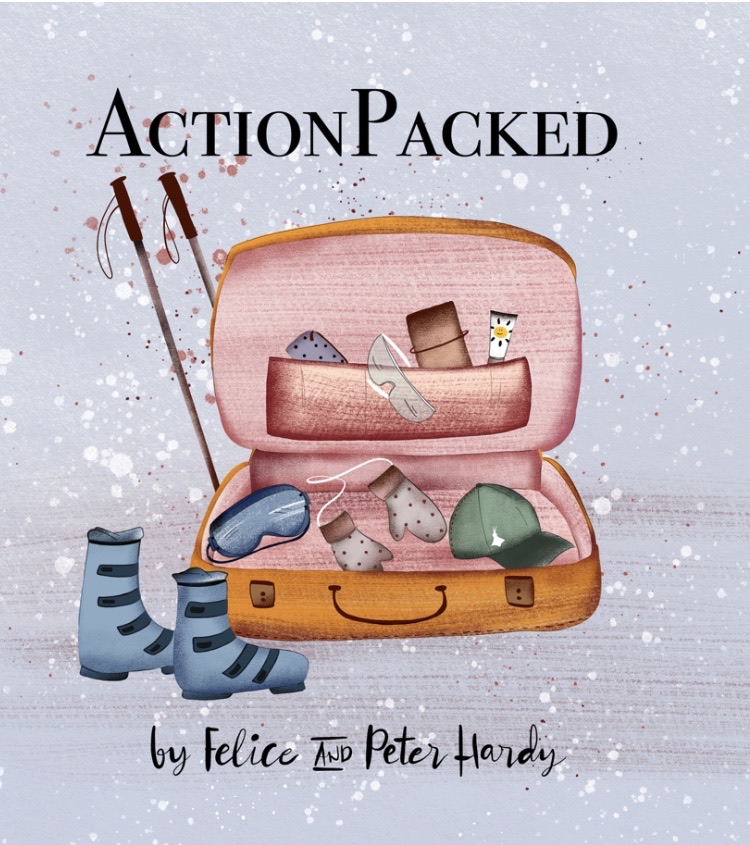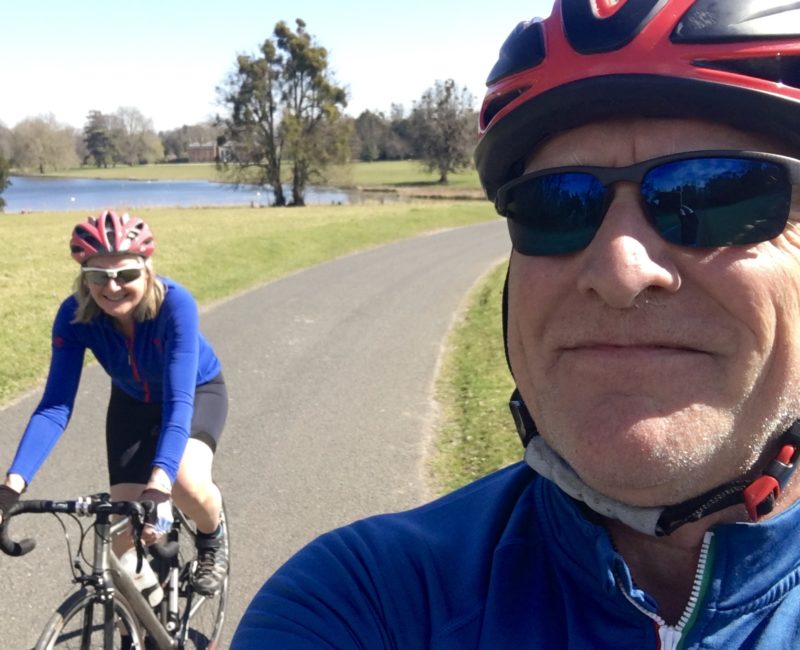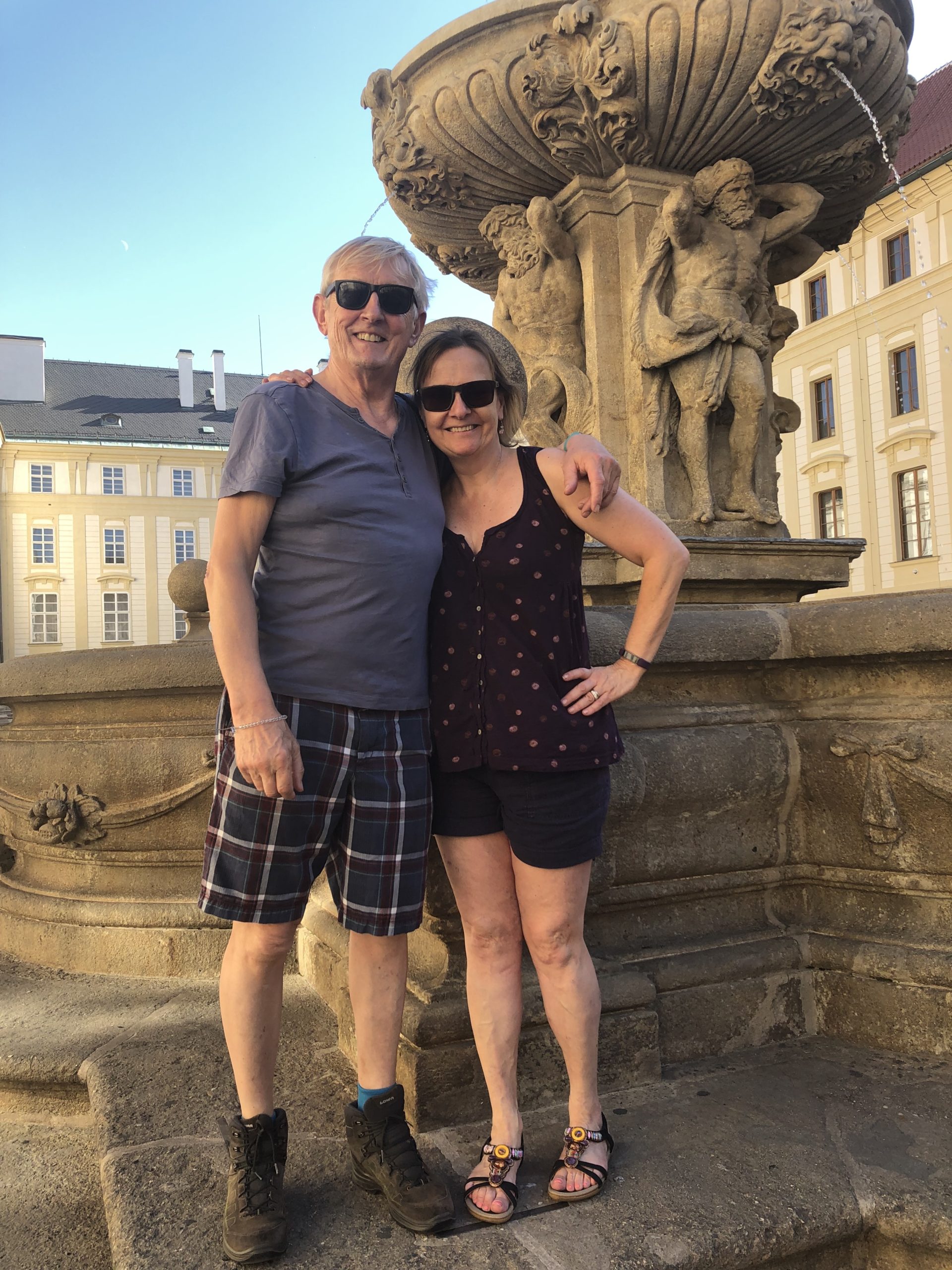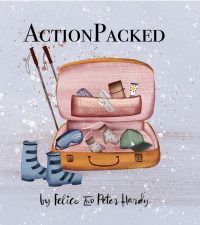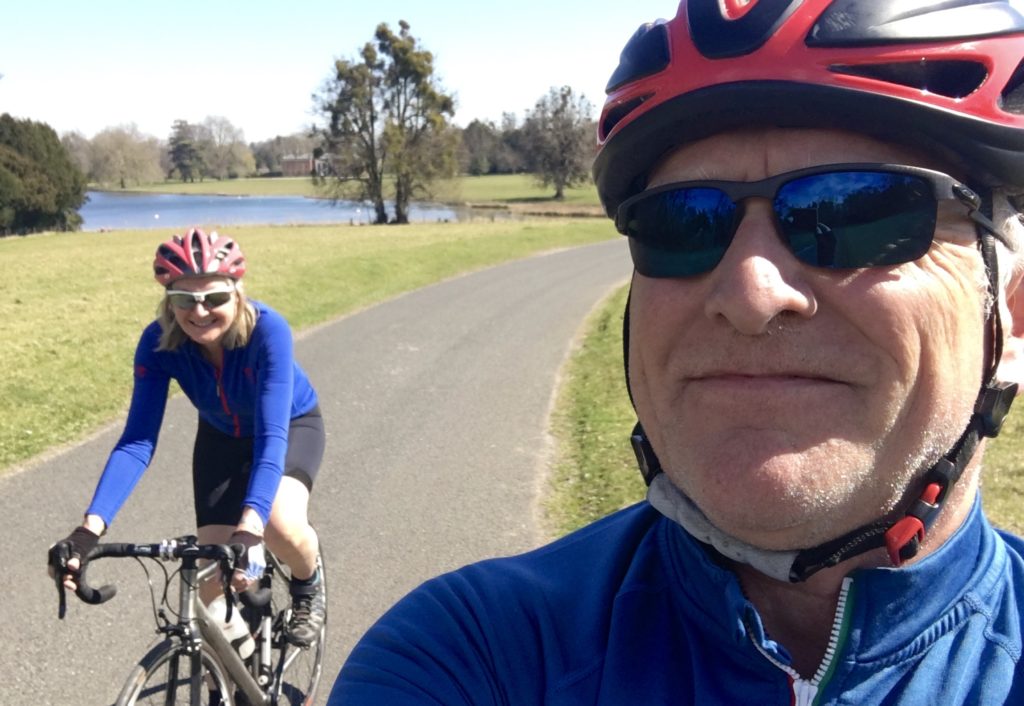
This week, we’re talking to Linda and Paul O’Halloran on our travel podcast. Paul’s a doctor and a keen cyclist who wanted to take time out from his GP practice and pedal rather further afield than his native Hampshire. For years, he’d been planning his ultimate sabbatical on the other side of the world. And then he met Linda, and she joined him on a gruelling trip across Southeast Asia. Was it make or break for the new relationship?
Peter It’s a little while back since you did this, but you cycled around Sri Lanka and then later around Vietnam, Laos and Cambodia. Why?
Paul Well, that’s a really good question, actually. I think probably why is different for both of us. But certainly for me, I’ve always enjoyed cycling, and the opportunity to get away and think, and just try to focus on the now was a great opportunity. For me once in a lifetime in the sense of I managed to get some time out of work. And before this, I only really had the standard week, two weeks’ holiday. Whereas this was an opportunity to do some real travel. So for me, it was very much a time to think, reflect, and enjoy some cycling and see some people and meet some people and experience bits of the world I hadn’t been to before. And yeah, enjoy the whole package of time really. I’m not sure about Linda.
Linda I was lucky because I did have time on my hands, which was brilliant. And Paul had introduced me into cycling quite subtly. And saying: ‘Yes Linda, you can cycle 60 miles to Portsmouth.’ Really? But then I did, and it was fun, and I enjoyed it. And then came the opportunity to actually spend a chunk of time together exploring new places on a bicycle. And he persuaded me that it would be warm, which was a big criteria for me. It didn’t quite turn out that way, but I was completely up to the whole adventure. Entrusting Paul to know how to build a bike, what we should be doing, and where would we go. But I was up for it.
Felice So what were the logistics of flying with bikes? I mean, how do you take them on a plane, for example?
Paul Well, the thing about taking any bike, it depends really on how sturdy the bike is. I’d spec-ed up some bikes that were pretty sturdy. But even so, plane handling companies are famous for destroying everything in their path, and bikes being no exception. So we ended up spending quite a lot of time packaging the bikes. We’d bought some some tough suitcases for them to go in. Although, interestingly, the suitcases I bought, which were rigid bags we decided eventually we couldn’t use because there’s nowhere to store them at the end. And so you ended up having to have somewhere where you can store all your packaging to bring them back again. And so logistically, it was a bit of a problem, but easily overcome with a bit of thought.
Peter Tell me about the bikes, first of all. You needed something a bit special for this did you?
Paul Well, I thought so. What I’d done, I’d spend quite a bit of time talking to friends who’d done some touring around Europe and around bits of Australia and America. But we were planning on going quite a long way off the beaten track, and so I wanted a bike that was firstly capable of coping with rough roads. Secondly, capable of carrying a fair chunk of weight. And thirdly, were going to be reliable. So, I spent quite a bit of time making sure that the gears – I ended up getting some things called Rohloff gears, which are gears in a hub at the back, and they are famously ‘fit and forget’ – they’re so reliable. The brakes, for example: I wanted the disc brakes because of the weight. But again, it was a cable rather than anything more complicated and the frames were very solid with a front suspension, but no rear suspension again. Everything was designed to just go, and just work, and have no issues hopefully at all. In fact, interestingly, we pedalled the bikes for four months each and didn’t have a single mechanical. I had a little bit of oil from my from my gears, which dripped onto the rear disc break. But apart from that, they were superb.
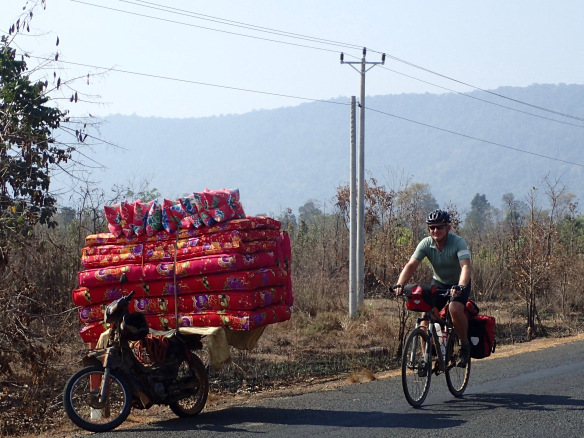
Siam Reep mattresses
Felice No punctures or anything like that on the way?
Paul Not even one puncture, which for a for a cyclist is unbelievable because usually we end up with a puncture quite frequently. So not even one puncture.
Peter So what did you take with you? I mean, it really makes you think very carefully about your possessions, doesn’t it?
Felice What sort of things could you take with you in the way of clothes and things like that?
Linda Well, we went we went through an essential list and the prime criteria is the minimum amount of weight. Because I’ve never done this kind of cycling before and we have two panniers each, mounted on the back of the bike and another pannier on the handlebars. So it was a case of trying to figure out what’s the least weight, so we have one change of shorts, we have the lightest tops. We had a couple of cycling tops and also we’re going to have to wash stuff, obviously. So taking the smallest amount of some sort of powder that we can use when we do get to a place where we can actually wash anything. I have to say we probably didn’t smell that nice to the whole trip of some point. We coped.
Paul You smelled better than I did! One thing which I had planned was to take a washing line with us. And it worked really well. The first few places we stayed with were quite smart hotels, and so they were able to wash stuff for us. But the first slightly more downmarket place we stayed where I wanted to wash our own clothes, I rigged up the washing line, put the clothes out to dry. Everything went very well – other than I left the washing line in the hotel afterwards so I never used it again. But it proved the concept, even if not the the ability to actually remember to take stuff with us.
Peter So in terms of a luxury item, what sort of thing did you take with you? I think you took a laptop, did you?
Paul For me, it was the laptop because I needed to work out vaguely where we were going and have some idea of the hotels or the guesthouses or wherever we could be staying. But the mixture of the laptop with my little sat nav on the bike made my navigation role much, much easier. We had a couple of mobile phones, but usually the batteries weren’t lasting very long. We did manage to download some maps on one website called Mapme, which we got from another backpacker. It was brilliant because it didn’t use any data, so it allowed us to navigate a little bit. Although of course if you’re wondering round the back reaches of Laos, the mapping isn’t great. And certainly the idea of working out where hotels is great if you’re in tourist areas. But as soon you get out of the tourist area, the data really isn’t that great. But for me it was a laptop and the navigation system.
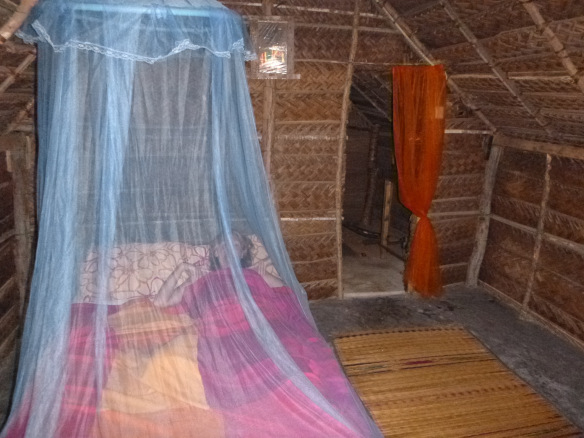
Hut for the night in Sri Lanka
Linda My luxury item was my camera. So a big part throughout the day was recording where we’d been, things we’d seen it. It was interesting to the two of us, at the end of each day we would download and look at all our pictures. Some of which I’d taken on my phone, which was perhaps easier to handle – when sometimes if suddenly I saw something…one being when we were in Vietnam and horrifically I saw this…there’s no wildlife there…and I saw this this man parked by the side of the road with his rifle aiming at one egret, one egret that was sitting in the fields and this man was going to shoot it. I was gonna take a picture of this egret sitting on this buffalo. So the camera was the big thing for me and we shared and compared lots of photos, had lots of different experiences to look at the end.
Peter So give me an idea of the overall journey? You started the journey in Sri Lanka, you got off the plane in Colombo. You picked up your bikes off the luggage carousel, put them together. And then what? You just pedalled down the road and off into the greatest adventure of your lives?
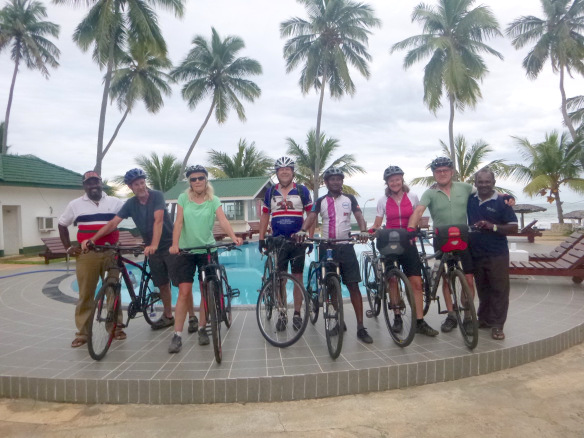
Bike group in Sri Lanka
Paul I’ve done quite a lot of cycling, but I haven’t done any long-distance cycling in second-world, more remote places. And so what we decided to do was pay for a guide for the first bit of the Sri Lanka trip. So this is very much a company – it was called Spice Roads, which anyone can sign on to. They’re superb. They hold your hand, they give you the routes. They book the hotels and they offer a guide on the road as well. So it was a very easy way to start cycling. So we had two weeks round Sri Lanka with them, and then we had two weeks completely by ourselves. And so the idea was that we would get into the way of things with the guide. And then we could use that time to learn the local traditions, perhaps some local language. For me, it was more importantly about how much things cost, because I don’t like the idea of not knowing that beer costs £2 and some street coconuts cost about £1. I don’t like possibly being ripped off in foreign countries, so that worked really well.
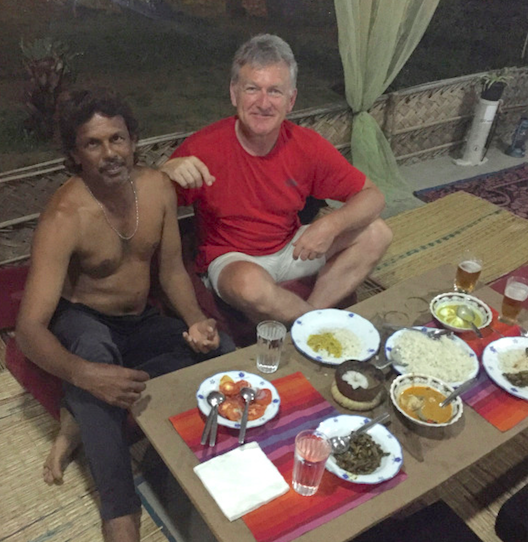
Food in Sri Lanka
Felice What was the typical food you ate in Sri Lanka? Did you like it?
Linda We loved the food. Lots and lots of curries. Never too hot, actually, often accompanied by some really interesting green beans. But it was really easy food, good calories for the cycling. So we were treated quite well with food in Sri Lanka, it was brilliant.
Paul One of the things I remember really clearly about Sri Lanka were the coconut flour curries, and they were absolutely beautiful. And that was the standard meal might be five or six different curries with some pulses, some rice, and the whole thing was delicious, actually. The food was great.
Peter The question that doesn’t usually get asked in interviews of such intrepid travellers, is curry…cycling…presumably a distinct absence of roadside loos? However did you cope?
Linda Through the whole trip really between the two of us there really was not an issue with any kind of stomach upset. I think a little bit of indigestion once for me, but nothing really…there was nothing insurmountable. Actually there was a little bit, wasn’t there, there was a time when I had to dash into the bushes, which you really don’t want to but needs must sometimes. But fortunately it didn’t last for too long and we didn’t feel unwell, so we could still cycle. It was okay. We managed.
Peter Paul, you’re a doctor, a GP. So did you have a big medical bag with you?
Paul Well, I was going to say, one of the other luxuries which we never actually really used. I did take with me a selection of well-chosen tablets, a mixture of painkillers and anti-malarials, anti-diarrhoea tablets, antibiotics and some fluid rehydrating powders…most of which we didn’t need. As Linda said, we had small episodes of diarrhoea, but normally lots of fluid and it just evaporated. I think we were pretty careful. We tried to eat as much local food as we could and in general, the more locals are eating the food the less like it is to be sitting around for months and months in a pot somewhere. So often you could see the food actually being cooked in front of you on the street – and that that usually worked out very well.
Felice In Sri Lanka, did you try any other sports, apart from cycling obviously?
Linda I was persuaded to do some whitewater rafting and I really was extremely reluctant to attempt to do any of that. And actually, I did do it and it was one of the best things…one of the highlights of the trip to Sri Lanka actually…except I did end up bringing some little creature back with me, which I didn’t realise at the time. I noticed that I was bleeding profusely down my thigh and Paul, being the doctor said: ‘That’s thinned blood.’ He realised I had a leech on me. And that was one of the handicaps in Sri Lanka, actually, there are a lot of leeches. So you have to be very careful when you step off the road onto the side to do nature’s business: you might come back with a few round your ankles and up your legs.
Paul I think the secret is to not be stationary for too long, because as soon as you’re stationary the leeches can smell the warmth of your blood ,and they’ll start running over towards you quite quickly in a slinky sort of way. If you move they won’t catch up with you, if you’re stationary for more than 30 seconds they start crawling up your leg.
Peter It sounds very unpleasant, but I’m sure you managed it. Tell us how how far did you cycle each day and then where did you stay?
Paul Yes, the distance depended a bit. I mean, what we tried to do was a day of cycling or two days of cycling and then a day of rest, so that we had a chance to see some of the countryside that we were in. It didn’t always work. In general, it was maybe 50, 60 kilometres a day, sometimes as much as 130, 140 if we ended up having to get somewhere else because there was nowhere else to stay. But in general, I guess on average is probably 60, maybe 70 kilometers, depending on the meters climbed as well.
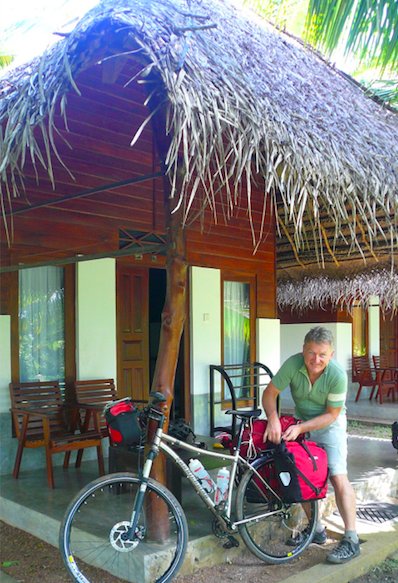
Packing the bike in Sri Lanka
Peter That’s that’s quite a lot when you consider the amount of weight on your bike. Do know how much the laden bike weighed?
Paul Yes, I weighed mine before we started and it was about 25 kilos.
Linda It was also quite hard sometimes with the temperatures across Sri Lanka when I do recall trying to cycle and actually counting the distances between posts because it was so hot and it was so heavy and we were so slow…and then trying to take the lead in front of each other to try and help each other out. So it was quite gruelling with the temperature sometimes.
Peter Where did you stay – the sort of quality of accommodation in Sri Lanka?
Paul I think Sri Lanka was great compared to other places we went to. In general, the quality of the accommodation was fantastic. It’s a small island, relatively. So you’re never far away from somewhere, somewhere good. We did stay in one place just north of Colombo called The Kite House, which was much more of a tent. I think that was seven dollars a night, so not expensive, but right on the beach and in a great position, lovely people. But the rest of the hotels were probably fairly unknown two-, three-star, very civilised and very much what people would expect. The more touristy places – you could be in England, everybody spoke English so well. There was the option to have English food if you wanted to. But again, off the beaten track was for us much more real and much more interesting, and actually more difficult to get to as well.
Peter So after four weeks, this was a kind of trial run in some ways, you flew home for Christmas. Enjoyed the turkey, recovered a bit, and then went straight out to Vietnam. For three months. Were you reluctant to get back on the road?
Linda Oh, not at all. No, we were very keen to get back away. And it’s January in England…who wouldn’t want to be going off to another adventure to somewhere hot? As it turned out, wasn’t quite as hot. Our first first excursion in Vietnam, we did have an organised trip again to get a sense the flavour of things and see how things were. And actually it was cold and damp and misty, and not at all what we’d expected.
Peter Did you have enough clothes with you?
Linda If we wore all our layers – absolutely. Pretty much wearing every single item from the panniers.
Paul This was one challenge, actually, for the bikes because we didn’t know we were going anywhere really cold. In theory, we weren’t. We were going somewhere temperate and above. And so being warm usually wasn’t the problem. Being dry was definitely a problem. So we had a waterproof layer. We had a couple of base layers, we had a couple of shirts. But being cold we didn’t think was going to be a problem. Going into Luang Prabang in Laos it ended up being the coldest February on record and it was unbelievably cold. It should be 18, 22 degrees. It was two or three degrees. It was unreasonably cold. And so we really struggled. Literally, as Linda said, we were wearing everything we had. If we had a duvet or if we had a sleeping bag, we would have worn that as well because we were so cold. So it was it was a challenge, packing enough clothes for different bits of the weather.
Peter So once you left your guide behind and ventured out on your own, that’s when it got tougher?
Paul Absolutely. The big benefit of having a guide was we didn’t need to make a decision where we were going, and didn’t need to make a decision where we were staying. So as soon as well, as soon as the guide left we had to get some idea of a route. We didn’t necessarily want to plan all routes in such detail for the next few days. So it was very much planning vaguely where we were going and vaguely where we were staying, not knowing how far the next hotel might be – or the next guesthouse might be, or even if there was a guest house at all. And that was one of the problems. And we also didn’t really want to stay on major roads because obviously lots of big lorries, lots of very fast cars, lots of bonkers people on roads. Whereas if we can get down back roads it’s slower, but a lot, lot safer. So it was logistically difficult.
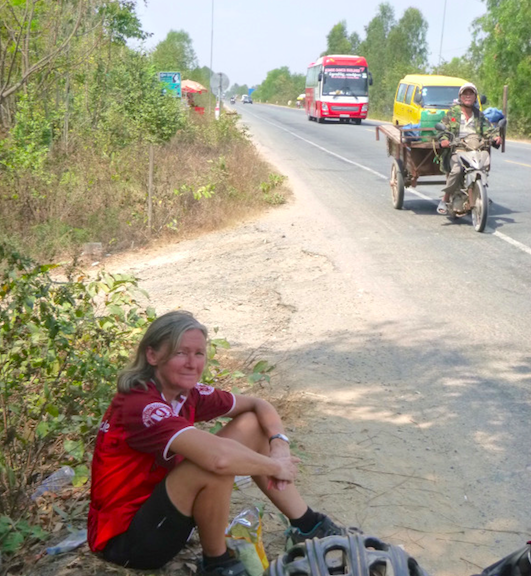
Road traffic near Phnom Penh
Linda We soon learned that every opportunity, and especially going across Cambodia, there was a place to buy water we needed to top up, because we did not know it could be another 50 kilometres before there’s another place. And certainly not in a place to start trying to drink tap water or anything being offered by locals. Yeah, that was a big thing.
Felice At one point you went to Hanoi on your bikes. What was that like? Must been really busy.
Linda Brilliant. It was actually really good fun, because when you realise everyone’s on bikes and scooters and it’s like a shoal of fish. So you just feed in with the shoal and you just wind and then with the rest of them. So it’s absolutely fine. It was actually quite exhilarating. Good fun. I enjoyed that part.
Paul Once you got to know the rules. Basically the rule is: once you start, don’t stop. If you stop and start trying to dodge people, they don’t know what you’re doing. So if you just slowly go forwards, generally they’ll avoid you. Not always. Unlike Phnom Penh where I think is the exact reverse, where it’s very fast cars, not lots and scooters everywhere. Whereas if you just go slowly out, they will run you over. Hanoi was great fun.
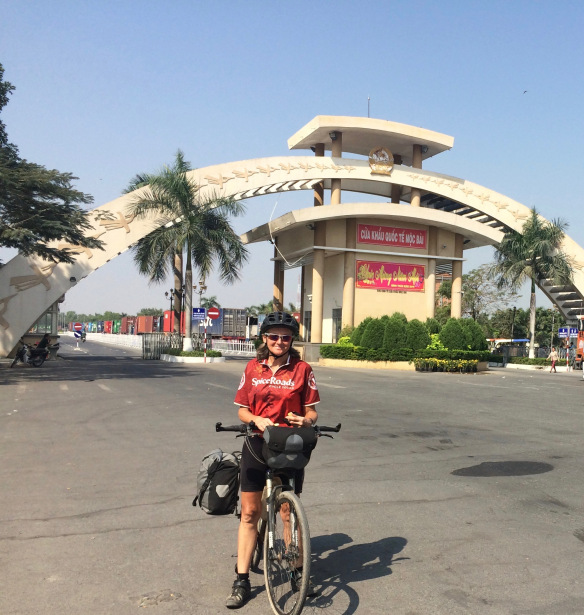
By the Vietnam-Cambodia border
Felice What about crossing borders? Was that easy?
Paul Yes, I think one border for me, particularly going from Cambodia back into Vietnam. I remember it very clearly and that was really, really hard work. We were we were told that there is going to be a $2 US fine – a fee just to have your temperature taken. And we thought, well this is crazy. Why would we have a $2 fee? But we accepted that’s what we were going to do. And it ended up being 15 dollars. But the alternative was to to be there for about six hours, so we paid the money, walked through. It was quite scary at times. Inscrutable people looking at you, not wanting to speak a word of English, going to a very quiet border. And really they’re just being paid to sit there. So they’re very, very happy for you to be there for as long as they choose, which can be for hours and hours. Being on a bike actually helped because we weren’t judged, so that was actually quite nice.
Peter The sun had come out by now and it was warmer…
Paul Going from from Vietnam into Laos, we had some lovely days, it was going to Luang Prabang where it was really, really cold. And then having spent four or five days in Luang Prabang, which is an amazing place that everybody should go to once, is on the Mekong, it’s an old French colonial town and it’s beautiful. It’s full of really interesting temples. The monks live there and come out every morning to get their food. It’s superbly interesting. Having left on Prabang, we then went down south, followed the Mekong down to Vientiane and then Savannakhet, and then suddenly someone turned the heat on. It went from 2 degrees up to 35 degrees in the space of one day. We came out of the mountains down onto the plane, and from then on we wished it was a little bit colder. It would have been lovely.
Linda One of the days that we had to plan to cross a river, which we thought that’s meant to be a ferry man there, that we knew that we had to get a lot of kilometres under our belt – I think over 100 that day. So we had to get up at five o’clock in the morning to get to the ferryman to get across the river to start peddling, because by nine, 10 o’clock, it’s going to be up to 35 degrees. So it’s been a bit of planning to try and get as many kilometres under our belt before it got too hot.
Peter You’re taking a huge amount of exercise. You therefore need to put in a lot of calories, I guess. What about the food along the way?
Linda For me, one of the best meals is when you most need it and get it where it. It was in Cambodia for me. Paul was a bit more hesitant about sampling the street food than I was, because actually I realised – and he soon realised – that if I didn’t have the calories I just stopped, I hit a wall and stopped. I just couldn’t carry on. And we ended up in this little village and there was a bit of street food going on. And it was a huge big cauldron of bones and stock and indescribable things you we didn’t really want to look too closely at. But I actually loved it. It was a savoury broth and Paul was forced to eat because this is all we have. And he really didn’t want to look too closely at the contents. But for me, it was the best thing ever. And it was like a switch turning back on again. I was then ready to cycle and OK.
Paul It was quite amazing because we’d be chatting away for kilometre after kilometre and then suddenly Linda wasn’t there. She was half a mile behind me and she literally just stopped. And I knew then that the fuel tank was empty and she needed something. Now usually we weren’t anywhere able to actually buy food, so we had to take with us stuff. And the only reliable stuff we’d managed to find were things like packets of crisps, which are fairly grim on a bike, but lots of bananas, lots of fruit, some bread rolls, which we would make up for lunch and anything else that we vaguely recognised as food on the way and as much water. I said 25 kilos, but sometimes we might have five or six kilos of water on board as well. Some of the roads ended up being almost no traffic, almost no people there at all. Also buying water was completely impossible.
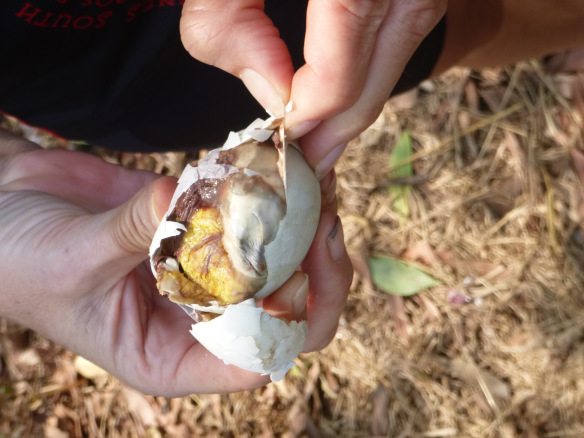
Chicken and egg
Linda There was one meal that I particularly looked forward to. We had gone through a little town, there was a market going on and there was this whole pile of eggs that looked like they’d been boiled, cooked eggs. And I was given a twist of a little wrapper with some salt and pepper and lime juice, I thought: a delicious couple of hard boiled eggs. I’m so fed up with bananas, they really don’t hit the spot, and would be a few hours into the trip and cycling along. I’m thinking: ‘Yes great, I’m going to have my hard boiled eggs,’ and I cracked open the first egg. There was a little chick inside there. So the embryonic chick with its soft beak and not fully formed. I thought ‘Ok, just an older egg. Try the other one.’ No, it’s the same thing: another little chick. Was this, of course what they like, eating? But hungry as I was, I couldn’t stomach the little chick. So no food that lunch. We just reverted back to bananas.
Felice I saw some pictures of a plate of worms…did you eat worms?
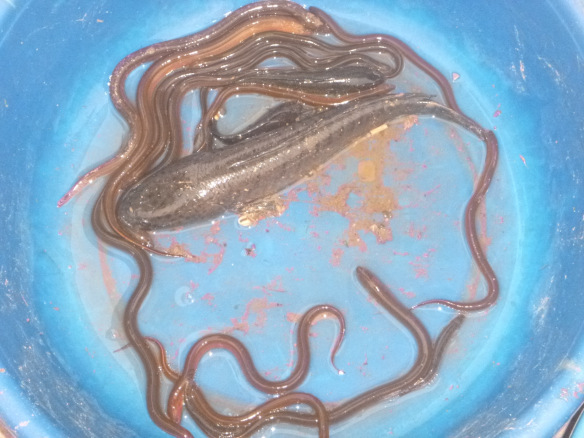
Lunch for locals, Vietnam
Paul Bits of Vietnam and Cambodia there’s all sorts of things that you can eat if you so choose. You can have barbecued locusts, which are fine. You can have barbecued chicken feet, which actually really nice. They’re actually quite expensive. You can also have barbecued scorpion, which we didn’t try and it’s quite expensive. A whole bunch of worms, but also some fairly horrible things as well in terms of bits of frogs’ intestines, bits of frogs’ gall bladders, all sorts. And then of course, famously in Vietnam there’s a great tradition of eating dog, which is by local tradition…
Linda …empowering. Families get together to build a house, which they do very quickly, and then to celebrate the building of the house it’s traditional to actually have dog meat. So we actually saw a dog that had just been slaughtered, and was being cleaned out and ready to barbecue to feed the family, which as pet lovers is quite tough to see.
Paul Again, it is a tradition which we struggle with. But of course, in some senses it’s not that different to eating lots of other different animals. Most of the Vietnamese, most of the time are vegetarian. So I suppose in a sense it is local custom. It’s considered quite empowering to eat snakes, for example, which again we wouldn’t be eating a lot of snake routinely.
Peter So at the end of a long day when you are very tired, you’ve got a 100km under your belt and you don’t quite know where you’re going to stay, you couldn’t obviously book anything in advance. You just turned up?
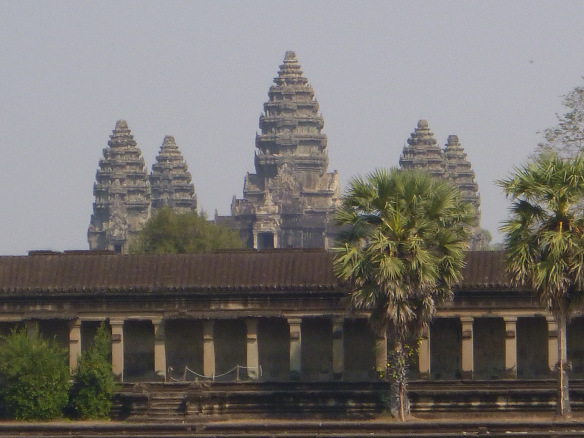
Angkor Wat, Cambodia
Paul Sometimes we booked if we were going. In all of these places, there’s a big difference between an area where there’s lots of tourism and an area where there’s none. Lots of tourism, we can usually get some Wi-Fi and we can usually book with Booking.com or whatever. And then that’s great, we know exactly where we’re going. And when we’re outside a tourist area, it’s much, much more difficult. You can’t even necessarily work out whether the place you’re trying to find or looking for is even a hotel. You’re never quite sure. So we ended up cycling around towns and villages trying to find somewhere to stay, but often just looking fairly helpless and hopeless. Locals ended up befriending us a bit and pointing us to the right places.
I remember one place on our way to Angkor Wat, being escorted to the only bed and breakfast type place by a man with a gun and an AK 47. We followed him on his moped to the only place in town, which there is no way we would have found as a bed and breakfast. It was just a house. And in fact, having found it, I’m not even sure it was a bed breakfast. But apparently it was.
Linda There was no breakfast, but it was a room with bars on the window and there was a toilet, and there was a big bucket of dirty water to wash with. But it was a bed and you could lock the door. I think a big thing for us was security at night that you could bring your bikes in and you could lock a door, that you could feel relatively safe. That was part of it.
Paul Having having founded it was great. Without him, we would not have found it. And then there was nowhere certainly within 20 kilometers in any direction that there was even a village. So it was very helpful.
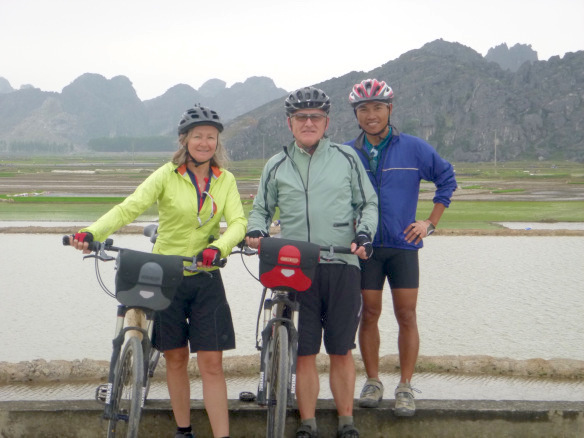
Felice Did you come across bedbugs or anything else horrible like that?
Linda I’m sure there were, because of some of the mattresses were particularly vile and disgusting. And it’s not the most romantic for us as a couple that we both climbing into our little silk sleeping bag liners with the mosquito net around us. It’s like I’m trying not to touch anything on this mattress. Don’t come anywhere near me. I’m not moving. Fortunately, we didn’t we didn’t we didn’t really get any nasty bites or things.I think we were as careful as we could be.
Paul Yes, we carried our own mosquito nets with us, which we sort of tried to hook over beds and we carried our own sleeping bag liners, which ended up being very effective and almost no weight.
Felice Did you have any injuries or any near-death experiences with lorries and things like that?
Paul I think we were pretty careful with lorries, every single time we heard or saw a lorry it was a near-death experience because they couldn’t give a damn about where we are. We were just basically an insect on their windscreen generally. And that was true for Vietnam, Cambodia, Laos and Sri Lanka. In fact, Sri Lanka in a way was worse, the passenger buses in Sri Lanka are absolutely crazy. You’ll be cycling along on the road would be the white chalk marks of where the damage had occurred, and you would often see five or six of these in a day, which hadn’t been washed off, and it was just the evidence of of carnage. The first day by ourselves we saw two accidents, all involving tuk-tuks. The second of which tuk-tuk had driven into a police car, so that’s how much carnage is on the roads. So I think we were very, very careful and as soon as you heard a lorry come behind us, you would make sure you were well to the side of the road. You weren’t swerving around and tried to be as defensive as possible.
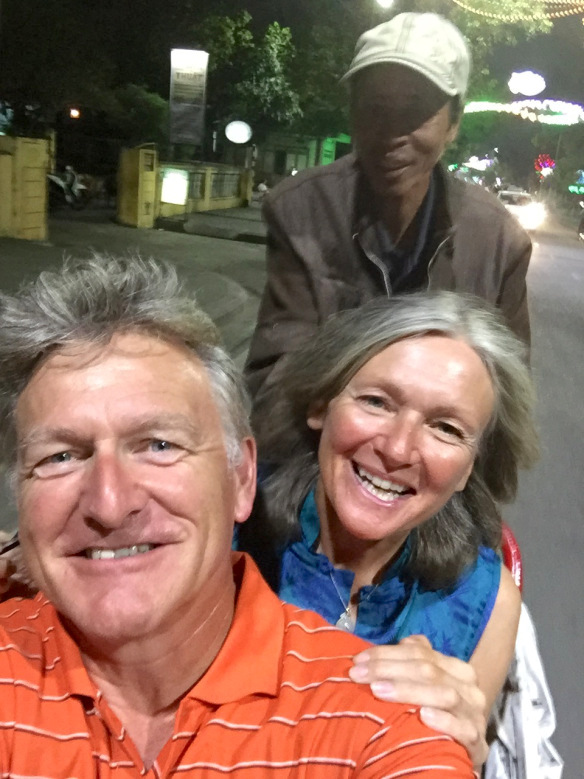
On a tuk-tuk
Felice Were there any animals on the road?
Linda Well, this is all well and good trying to get to the side of the road. Apart from that, there’s dogs in Sri Lanka, particularly. Some that dogs lie in the road, crazy, crazy thing, because actually the buses and the cars don’t care. So we saw lots of three-legged dog and dogs with bones sticking out.
Paul Another thing that was notable for me was there were a lot of Sri Lanka is amazingly full of animals, wildlife and domesticated animals. And as Linda says, the dogs are extraordinary. They really are everywhere. In Vietnam, there’s almost no animals. There are very few wild animals. There are domesticated pigs and cows and things. But it was notable to me how lacking in wildlife the whole of that continent, the whole of Vietnam, Laos and Cambodia, is. Laos less so than Vietnam and Cambodia particularly. Very few animals to get in the way, sadly, very few animals at all.
Paul I think one of the extraordinary things about Cambodia, Vietnam, was obviously the American war, as they call it, the Vietnamese war. And also the history of Pol Pot in Cambodia. So it’s three countries that have been absolutely destroyed over the last few decades, and they’re still suffering now. Bits of Laos have had so many bombs, so many unexploded ordnance on their land. There is still hundreds of thousands of acres they can’t use because the unexploded ordnance. And if you add the idea of Agent Orange defoliating all of the forests, and things still can’t grow now, it’s a country that has been absolutely ravaged by their history. And we spent quite a bit of time in all the areas looking at the Khmer Rouge history in Cambodia and the Vietnamese-American war, secret war in Laos and Vietnam. And it tells a shockingly awful story, quite profound at times.
Peter Now, you became obviously wrapped in your own bubble and you two of you going together in this remote scenery and remote place. And then I think once or maybe twice, you left the bubble and met up with friends.
Linda A highlight of our trip for us. You realise when you when you’re travelling. Yes, we were very self-sufficient and we got on really well together for the whole trip. But in Luang Prabang we had arranged to hook up with a couple of really good friends, Sian and Lawrence, who had swanned in up the Mekong first class and then we went out for an amazing meal at one of the top restaurants in Luang Prabang, which actually blew our budget for the next few weeks. But the extraordinary thing was it was so cold then. And so we sat in this restaurant, which is not geared to have even windows and it was all open. We sat there with as much clothing as we could, and the restaurant even lit braziers underneath the wooden tables trying to keep us warm. But it was a very memorable meal. And the three of us did choose buffalo steaks, which were delicious. Paul decided to go for the local delicacy of the Mekong River fish, which he hugely regretted as it tasted like pond weed and mud.
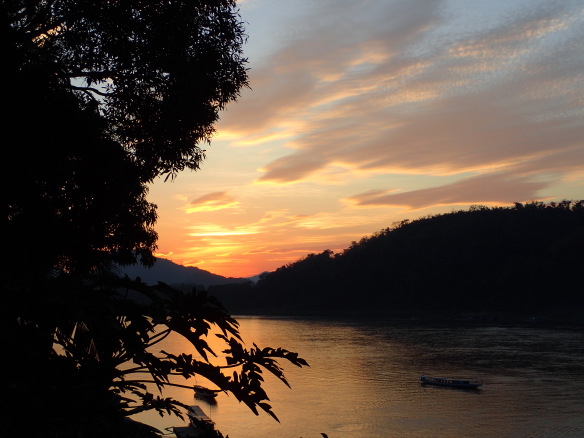
Sunset on the Mekong River, Laos
Paul It tasted like river. It was horrible, but a memorable meal. Yeah, I think that meal was almost our week’s budget for food.
Linda But great to see a good couple of friends.
Peter A memorable meal but bad bill?
Linda Yeah, but good wine.
Peter Paul, you love a glass of wine. Did you manage to find the occasional tipple along the way, or did you stick firmly to water?
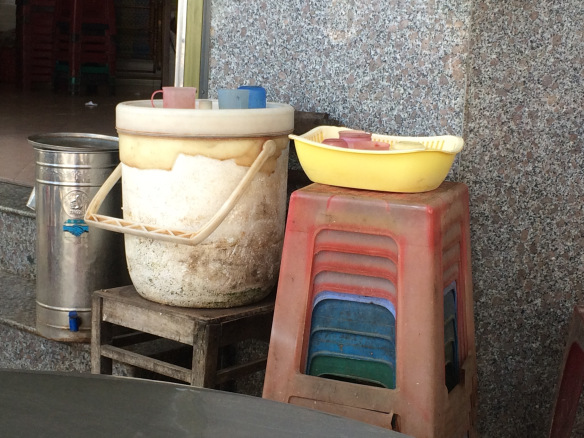
Free drinking water
Paul Well, we did have the occasional beer, like sort of every day. There’s an absolute requirement for every every place to sell it for the same price, and so I think it was 50 cents, a dollar for a terrific bottle. So every night was beer. There was almost no wine. We did manage to find in Vietnam there’s an area of vines called Dalat, which actually is not quite to European taste, shall we say. It’s quite hot, it’s quite dry. Some of the wines I’m sure are very good. But we didn’t manage to find any local wine at all. But beer was a highlight to look forward to every evening, a cold beer when we could possibly find it.
Felice Did you get fed up with the food by the end? Did you wish for home cooking?
Linda No, not really. And in fact, in some ways I think what we brought back with us is a love of the simplicity, especially Asian savoury broths with lots of fresh herbs, I think are some of the nicest foods ever. And coming back home, I just actually wanted to have less of everything, less of clothing, less of food stuff. It did change for quite some time my view of how we live our lives.
Paul I think that it was a battle with getting any food at all. And so sometimes I would be craving the savoury broths, which were salty and warm and tasty and delicious. I could eat one of those now, actually. I really enjoyed those.
Peter How many kilometres in all you do altogether?
Paul Just under seven thousand kilometres in total. Over a period of four months.
Peter A high point of the whole trip?
Paul Really hard one to answer actually.
Linda I think there were so many. I think the highlight would be the wildlife that we did see in Sri Lanka. We did do a wonderful safari that wasn’t too crazy with loads of jeeps or anything. And we ended up coming alongside two elephants. There was a mother elephant, and standing below her the tiniest baby elephant that was actually suckling from the female’s breast. It was most extraordinary moment to be that close and to witness in the wild an elephant that’s surviving. Is is reproducing. That for me, was was pretty amazing.
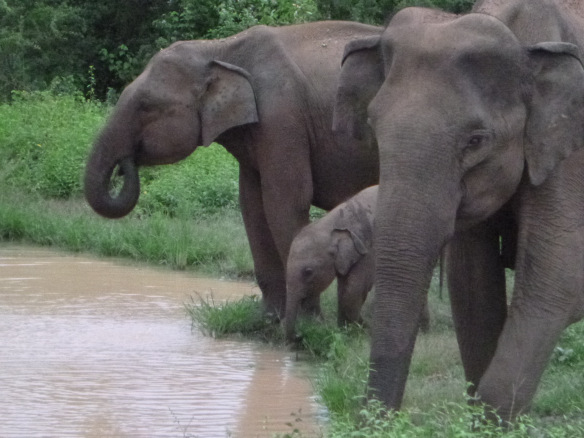
Elephant family, Sri Lanka
Paul And I think my highlight actually was when we were cycling up the east coast of Vietnam, we’d had day after day of hard weather and wind on our nose. It was raining and horrible, and we were cycling up to Hoi An which is quite a touristy, lovely city. We were really looking forward to it but I’d made a few decisions about the route, which I wasn’t sure was going to work because our map stopped and I thought we might be on the wrong side of a river. And we were soaking wet, cold and miserable.
A girl passed us and on a little moped and she said in quite good English, ‘You OK? Are you lost?’ And I said, ‘I hope I’m not lost. I hope that’s the way to Hoi An.’ She said, ‘Yes, it is. It’s about 15 kilometers.’ Great. And we were cold and wet and miserable. We didn’t think anything of it, but five minutes later, she came back and we thought, ‘Oh, we recognise her. We’ve just spoken to her. Wonder what she’s come back for?’ And she’d gone into Hoi An and bought us some waterproof capes because we looked so cold and miserable. She gave us these waterproof capes and said, ‘There you go, you’ll be a little bit warmer, a little bit dry now.’ And I thought that was just fantastic, just the completely unnecessary kindness of strangers. And it was absolutely amazing.
Peter The low point of the whole trip?
Paul I think probably for me, again, about three days before my high point we’d found a hotel that was actually on the internet and looked quite good. And it took us about three hours to find it. And we got there and it was run down, there was no one there. We’d had a really hard day of 130 kilometres to get there. And there was no food, no people, and it was just so depressingly cold and windy. And I was so keen to leave that place. We were miles away from anywhere.
Linda Is that the one with the toenail clippings on the carpet?
Paul It had a swimming-pool, but the swimming-pool was dry and full of sand. And it was on a beach, but the beach was was full of rubbish. Everything awful about Vietnam was in that hotel.
Felice Was there anything you wish you’d known before going on the trip?
Paul How much fun it was, because I would have done it years before. Because although it was sort of hard, but not hard. I think it’s the sort of thing that anyone can do with a little bit of spirit. It’s great fun. You can choose what you do on the day. I wish I’d known how much fun it was going to be.
Peter One tip each for anyone considering doing the same sort of trip?
Linda Take Paul with them. He was absolutely amazing with the navigation, and I do recall one of those in Phnom Penh where I wouldn’t have a clue how we going to find this place to stay. And he is cycling round this roundabout that was absolutely chaotic with vehicles. I’m trying desperately to keep up to and see him, trying to weave in also in amongst all the vehicles. He has one hand on his handlebars, the other hand on his sat nav. So I’m trying to figure out where we get off this round about how do we figure out where we’re going. It was just so impressive. He was amazing.
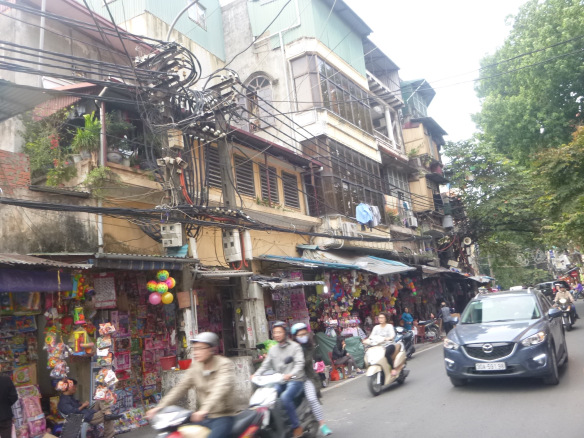
Busy Hanoi
Paul Well, thank you. My one tip would just be do it. Take a credit card, because that’s the get-out-of-jail-free card .
Peter At the time when you plan this and set off together, you’d just started living together as a couple. Quite a brave thing to do to be thrown together under such extraordinarily intimate circumstances for such a long period. It obviously worked because you’ve just both got married. So congratulations.
Linda Thank you very much. I don’t know if anyone heard David Hockney has been sharing some thoughts and he’s been reproducing some more pictures on his iPad. His thoughts were: there are two things most important that we need in life, and that’s food and love. And absolutely this psychic experience was…topmost all the time,…was about food and love. And it was the strength of our relationship that kept us going. And the people that we met, the highlights would be the people who showed that they were keen for us to be in their country. The kids waving in Sri Lanka, the acts of kindness of people, those were those were highlights for us.

Paul Also, it does test any relationship when you’re stressed. I remember when we found a little hotel in quite a big city in Vietnam and we couldn’t find the hotel again. We ended up being quite cross with each other.
Linda So we were going to go and get some food. We’d wandered off and then we realise, shit, where was the hotel? Did we do a left here? Did we do a right here? We both disagreed. There was some some expletives shared. ‘I’m not cross with you. I’m just tired and hungry and I want to get to bed’.
Paul We were genuinely not sure we’d ever find our hotel again, because the hotel just looks…it’s not a hotel that is obviously a hotel. It was just a house like every other house in another million houses. It wasn’t scary, but it was frustrating and it tested us.
Peter Paul and Linda, thank you very much for coming on the show. We wish you the best for future.
Paul and Linda Thank you very much indeed.
Felice That’s all for now. If you’ve enjoyed the show, please share this episode with at least one other person! Do also subscribe on Spotify, i-Tunes, Stitcher, or any of the many podcast providers – where you can give us a rating. You can also find us on Twitter, Facebook and Instagram. Stay safe and we’ll see you next week. If you enjoy this episode, please share it with at least one other person.
For more pictures and information, visit Paul and Linda’s Cycle Blog. Also see Travels with the Hungry Cyclist and Cycling To Australia With A Cricket Bat
© Action Packed Travel

- Join over a hundred thousand podcasters already using Buzzsprout to get their message out to the world.
- Following the link lets Buzzsprout know we sent you, gets you a $20 Amazon gift card if you sign up for a paid plan, and helps support our show.
Our Kit (compiled by Paul)
- Bike: 29er MTB, Titanium Van Nicholas Zion’s, with Rohloff gears and rear rack. Hard tail. Avid BB7 mechanical brakes. Rock Shox Reba front fork. Hope front hub. Mavic tubeless rims, although with tubes. Ergon bar ends, which will add that little bit of comfort. Indestructible and, hopefully, totally reliable. We will see. Not the fastest touring rig, but should cope with anything the roads throw at us.
- Panniers: Ortlieb rear panniers, with Ortlieb handle bar bag. Such good kit. Solid, waterproof and flexible.
- Saddle: I thought about this but have always been pleased with my Fizik Gobi. I hear so many good thinks about the Brookes range. But a leather saddle in the middle of monsoon weather? Nope, can’t be done. Fit and forget, again.
